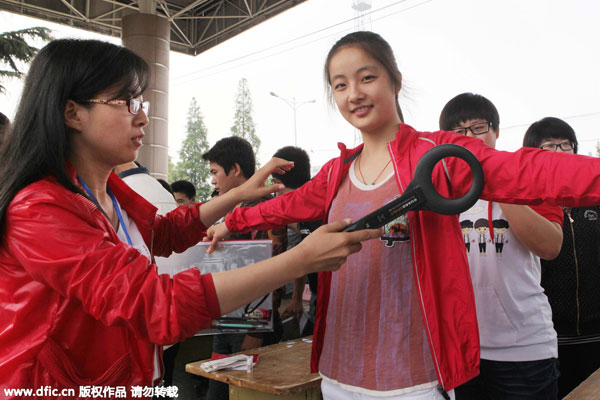 |
|
A student goes through a metal detector in Lianyungang, Jiangsu province. [Photo/IC] |
An undercover journalist from Guangzhou-based Southern Metropolis Daily infiltrated a gang in Jiangxi province to expose its racket of arranging for fake candidates to take the national college entrance examination (gaokao) for others. This is the biggest gaokao-related news this year.
After the news broke out, Jiangxi education authorities said they had arrested two people for taking gaokao under other candidates' names and asserted that they would launch a joint investigation with police into the issue.
Education authorities both at the central and local levels have been reiterating that they will take measures to prevent cheating at gaokao. Local authorities in Luoyang, Henan province, have even used radio monitoring drones to prevent cheating. Yet scandals like the one in Jiangxi continue hitting the headlines.
The journalist who exposed the gaokao racket has suggested stronger technological measures to prevent cheating. Indeed, advanced technology can help the authentication process and prevent cheating. But since gangs such as the one in Jiangxi don't rely on advanced technology, the need is to prevent gang members from conniving with officials who oversee the exam and admission procedures, because without the latter's help fake candidates cannot get admit cards to take gaokao. Moreover, how can fake candidates enter examination halls if supervisors are strict with verification?
Last year, authorities in Henan province found 127 examinees had "hired" other people to write the exam for them. Investigation revealed an illegal agency had bribed some exam supervisors and "hired" college students from Wuhan, Hubei province, to write the exam for some Henan students. The key to preventing cheating in gaokao, therefore, is stricter vigilance on people rather than the use of advanced technology. As long as exam supervisors keep taking bribes to facilitate cheating, gaokao scandals will not end.
In fact, almost all cheating scandals exposed in recent years have involved local exam officials, especially supervisors. Also, students will not be able to carry high-tech cheating devices into examination halls if supervisors are strict with inspections.
Some people have suggested students be compelled to sit for gaokao in other provinces and regions to prevent local exam officials from taking bribes to facilitate cheating. But this arrangement will not necessarily end cheating, because if gangs can bribe local exam officials, they can also bribe those in other places.
The first thing the authorities should do to prevent examination officials from conniving with gangs is to strengthen the supervision mechanism for the education and examination systems. The fact that impostors can easily get fake identification and admit cards for gaokao shows that there are loopholes in the exam and admission systems. Therefore, the authorities should strengthen supervision on the accreditation system to prevent the abuse of power for money. Cracking down on corruption in the education system is important for preventing illegal practices in gaokao.
Second, all cheating cases in national-level exams should be investigated by independent judicial officials. Local education and examination officials should not be allowed to be part of the investigation. In fact, the independent judicial officials should be allowed to decide whether local education and examination officials should be brought to justice, because the latter are involved in almost every cheating case. In fact, the Jiangxi case should also be probed by independent judicial officials.
Third, examination officials involved in cheating cases should get severe punishment. Currently, the punishments such officials get are always administrative in nature and/or according to Party discipline rules rather than according to the law.
The involvement of examination officials in cheating cases is a serious violation of the law, but such officials cannot operate with forming nexus with other education officials. So the authorities should strengthen the accountability mechanism for education and examination systems and warn potential corrupt officials that they will face severe punishment if they indulge in corruption.
The author is vice-president of the 21st Century Education Research Institute.

I’ve lived in China for quite a considerable time including my graduate school years, travelled and worked in a few cities and still choose my destination taking into consideration the density of smog or PM2.5 particulate matter in the region.